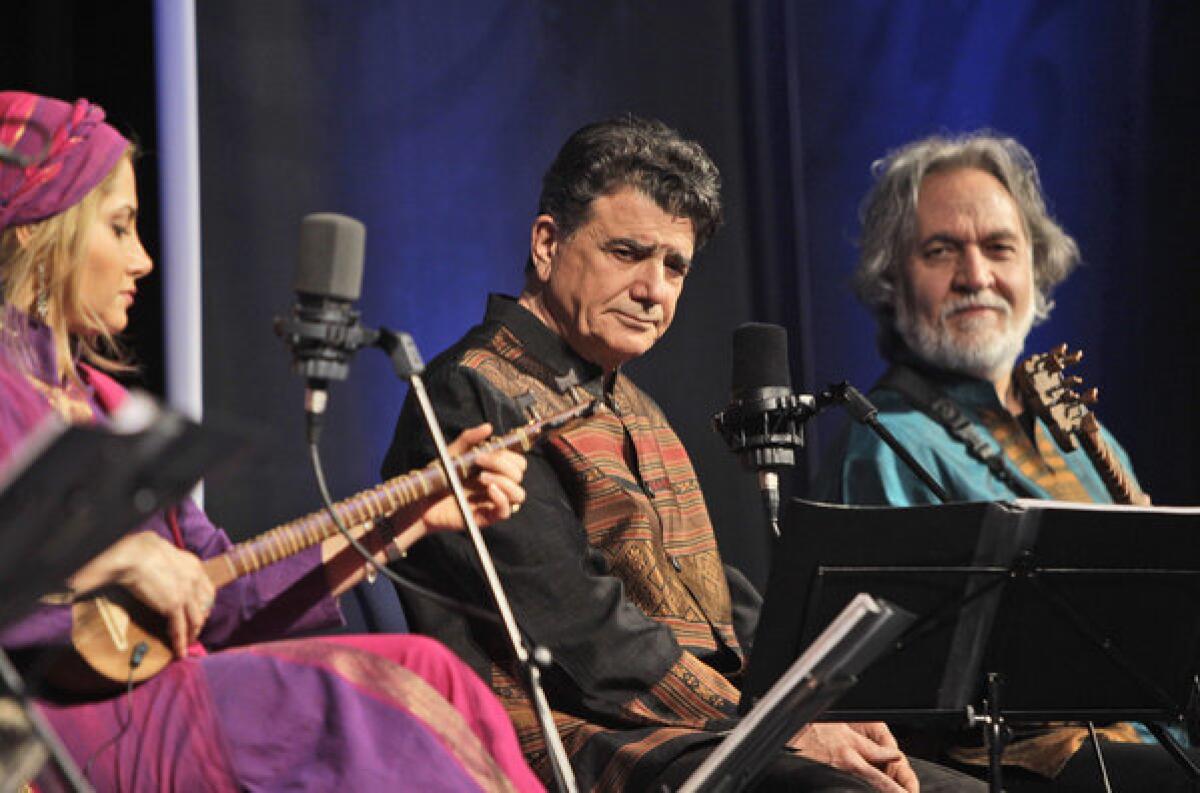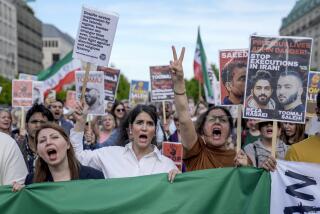Iranian music master Shajarian, who backed anti-government protests, dies

- Share via
Mohammad Reza Shajarian, whose distinctive voice quavered to traditional Persian music on state radio for years before he was blacklisted for supporting protesters after Iran’s contested 2009 election, has died.
Shajarian enlivened Iran’s traditional music with his singing style, which soared, swooped and trilled over long-known poetry set to song. But the later years of his life saw him forced to perform only abroad, after he backed those who challenged the disputed reelection of hard-line President Mahmoud Ahmadinejad by telling state radio to stop using his songs.
“After what happened, I said ‘no way’ and threatened to file a complaint against them if they continued to use my music,” Shajarian said in 2009.
The TV report said he died on Thursday after a long battle with cancer. Shajarian’s son, Homayoun, tweeted that his father “flew” to meet the heavens. He was 80.
Within hours, Shajarian’s fans began gathering outside the Jam Hospital in the country’s capital, Tehran, where the singer died, several crying openly. One man sat on the pavement, his head in his hands, weeping. A teacher, 34-year-old Hasti Amini, said she was deeply saddened, describing Shajarian as “the people’s voice in difficult times.”
“He was the great child of Iran. He was a big person and was very precious to us,” said another fan, Paria Hosseini. As night fell Thursday, the crowd lit candles in a vigil honoring the national icon.
Iranian Foreign Minister Mohammad Javad Zarif tweeted his condolences, saying, “Maestro Shajarian was a great & true Ambassador of Iran, her children and — most of all — her culture.” Iranian President Hassan Rouhani praised Shajarian for the “timelessness” of his songs.
In March 2016, Shajarian revealed to fans he had been receiving treatment for kidney cancer for some 15 years, both inside and outside of Iran. Highlighting his importance even then, Iran’s culture and health ministers announced they would follow his case.
Shajarian’s political stand surprised many in Iran, especially among the young who considered him a crooner of a past age. Though he once changed his name to avoid his conservative father’s opposition to his singing, Shajarian supported Iran’s movement against the American-backed shah. He resigned his position with Iranian state radio ahead of Iran’s 1979 Islamic Revolution.
After the revolution, it was Shajarian’s powerful voice on the radio that sang a prayer before sunset during the holy month of Ramadan, when observant Muslims fast from dawn to dusk.
Because he was supported by the apparatus of Iran’s cleric-run system, no one expected to hear his voice rise to support the opposition in the unrest surrounding the 2009 balloting. At the time, Ahmadinejad won a contested vote count that sparked massive protests and a security force crackdown that saw thousands detained, dozens killed and others tortured.
In September 2009, just months after the election, Shajarian sang “Zaban e Atash o Ahan,” which translates from Farsi as “The Language of Fire and Iron.”
In it, the singer pleaded: “Lay down your gun. Come, sit down, talk, hear. Perhaps the light of humanity will get through to your heart too.”
Shajarian then told state radio to stop using his songs, which it did. Suppression of artists had been common after the Islamic Revolution, though the 2009 crisis brought on a crackdown not seen in years.
“It’s much greater now because of the stand most of the artists have taken against them,” Shajarian said in 2009. “For now, they’re moving very calmly. But in the future, I know there will be a confrontation between the artists and this government.”
In the years that followed, Shajarian performed traditional music for Iranians abroad and later returned to Iran to teach singing to many of his adoring fans.
Shajarian was born Sept. 23, 1940, in the religious city of Mashhad in northeastern Iran, 620 miles east of Tehran. During his childhood, he got his start in singing through reciting the Quran.
Throughout his life, he received a series of accolades, including awards from the United Nations’ cultural agency, UNESCO. In 1999, the agency gave him the Picasso Award, and in 2006 he received its Mozart Medal in honor of his contributions to the world of music. Shajarian also worked to create new instruments, similar to those played in historic Persia.
Upon the news of Shajarian’s death, many Iranians offered their condolences on social networks. The official IRNA news agency called Shajarian a “unique” artist. For the first time in over a decade, state TV showed file footage of the singer.
Jam Hospital said Shajarian’s body was taken to the Tehran cemetery, in preparation for transfer to Toos, where he will be buried, a town near Shajarian’s birthplace of Mashhad in Khorasan Razavi province.
When news of the burial place filtered down to the crowd outside the hospital, some started chanting against the decision, alleging the family had picked the location under government pressure.
Shajarian’s son Homayoun, a singer like his father, denied this and begged the crowd not to turn the gathering into a political conflict.
“Art is more respectful than politics,” he said.
More to Read
Start your day right
Sign up for Essential California for the L.A. Times biggest news, features and recommendations in your inbox six days a week.
You may occasionally receive promotional content from the Los Angeles Times.






